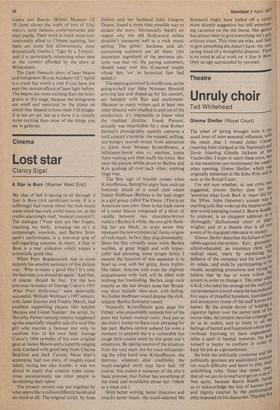Cinema
Lost star
Clancy Sigal
A Star is Born (Warner West End) My idea of hell is having to sit through A Star Is Born (AA certificate) twice. It is a sufferingly bad movie about the rock music scene which has truly awful music (or, as the credits alarmingly read, 'musical concepts'). The dialogue (`Your eyes are like fingers, touching my body, arousing me so') is surpassingly mawkish, and Barbra Streisand's performance is a non-stop aria of self-regarding cuteness. In short, A Star Is Born is a real stinkeroo which wastes a potentially good idea.
When Peter Bogdanovich was in town recently his sensible summary of this Picture was: 'Why re-make a good film? It's only the bad ones you should do again.' And that, of course, should be that. Yet the two previous re-makes of George Cukor's 1931 What Price Hollywood? were deservedly successful. William Wellman's 1937 version, with Janet Gaynor and Fredric March, had excellent supporting players like Adolph Menjou and Lionel Stander; the script, by Dorothy Parker (among others), toughened up the essentially maudlin tale of a waif-like girl who marries a famous star only to outshine him in his own field. George Cukor's 1954 re-make of his own original gave us James Mason and a superbly singing Judy Garland with good help from Charles Bickford and Jack Carson. Moss Hart's screenplay had two stars, of roughly equal talent, loving but also hostile; it was not afraid to imply that creative types sometimes unconsciously use other people in developing their talent.
The present version was put together by what seems like a million different hands and no mind at all. The original script, by Joan Didion and her husband John Gregory Dunne, found a more than possible way to update the story. Intrinsically there's no reason why the old Hollywood milieu shouldn't transpose well to a rock music setting. The glitter, hardness and allconsuming audience are all there. (An important ingredient of the previous pictures was that we, the paying customers, should weep over this ill-starred couple whose fate 'we' as hysterical fans had sealed.)
The opening scenes of Kristofferson ,as the going-to-hell star John Norman Howard arriving late and doped-up for his concert, are handled with flair and excitement. (Because so many writers and at least one other director were shuffled in and out of the production, it's impossible to know what the credited director, Frank Pierson, actually was responsible for.) And Robert Surtees's photography capably captures a rock concert's hysteria : the massed, milling, star-hungry crowds switch from adoration to lynch fever because Kristofferson, a helicopter-borne deus ex marhina, keeps them waiting and then muffs his lyrics. But once the picture settles down to Barbra and Kris gushing all over each other, nothing rings true.
The first sign of trouble comes when Kristofferson, fleeing his angry fans, ends up forlornly drunk at a small club where Esther Hoffman (Barbra) is the lead singer in a girl group called The Oreos. (This is an American race joke : Oreo is the trade name of a sweet biscuit composed of a sliver of vanilla between two chocolate-brown wafers.) Barbra is white, the two girls flanking her are black; in story terms they represent the non-commercial, funky origins of rock music. In fact, they sing abominably. Since the film virtually stops while Barbra warbles, at great length and with impeccably bad phrasing, some syrupy lyrics, I assume the function of this sequence is to bowl us over with her gritty, Janis Joplinlike talent. Anyone with even the slightest acquaintance with rock will be filled with nothing but foreboding. Barbra sings rock exactly as she has always done her Broadway show ballads : slow-slow, with feeling. An Esther Hoffman would despise the slick, unjazzy Barbra Streisand sound.
Naturally Kristofferson goes gaga for Esther, who presumably reminds him of his poor but honest musical roots. And just as she didn't bother to learn rock phrasing for her part, Barbra cannot unbend for even a moment to pretend she is a vulnerable but tough little cookie awed by this great star's attentions. By taking control of the situation from the very start, not for once relinquishing the whip hand over Kristofferson, she destroys whatever slim credibility the much-mangled story may have had. Of course, this makes a nonsense of the plot's basic premise, that Esther has something of the meek and mouldable about her. (Meek as a meat axe.) • With better writing, better direction and (much) better Music, the multi-talented Ms
Streisand might have pulled off a rather more sharply suggestive but still entertaining variation on the old theme. Her genius has always been to give everything she's got. without stops. This time she tries, and fails to give something she doesn't have: the sore caring mind of a thoughtful director. There is no mind at all at work on A Star Is Born. Only an ego surrounded by yes-men.






































 Previous page
Previous page